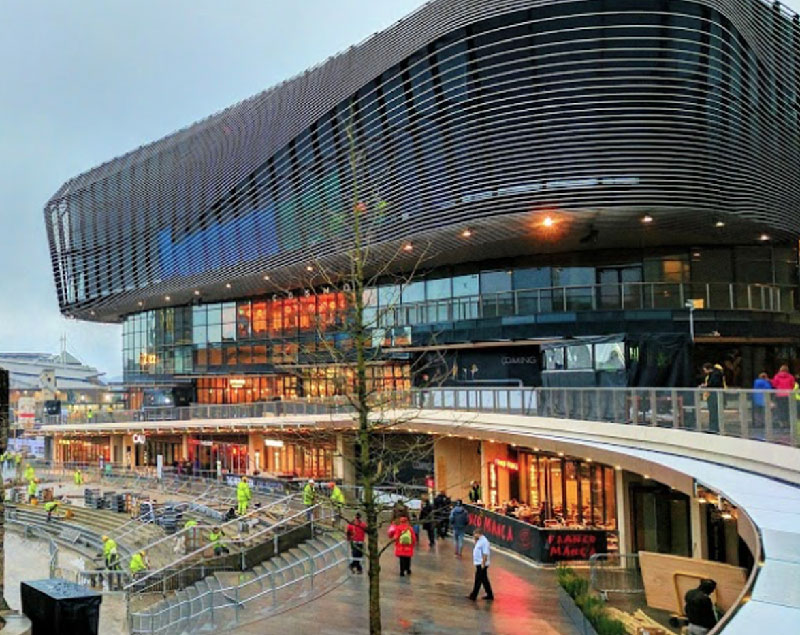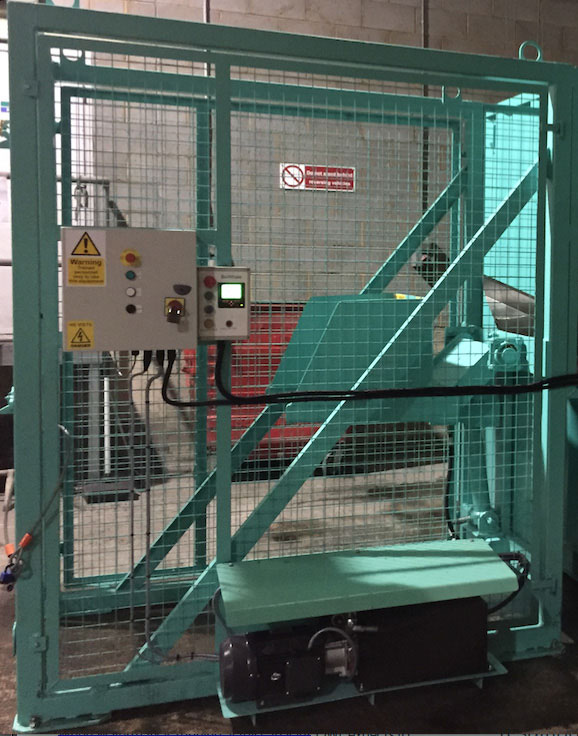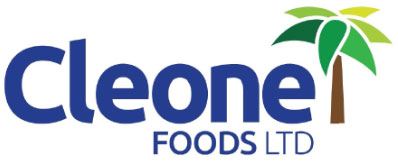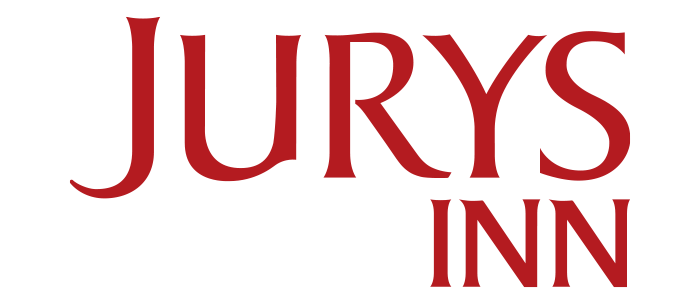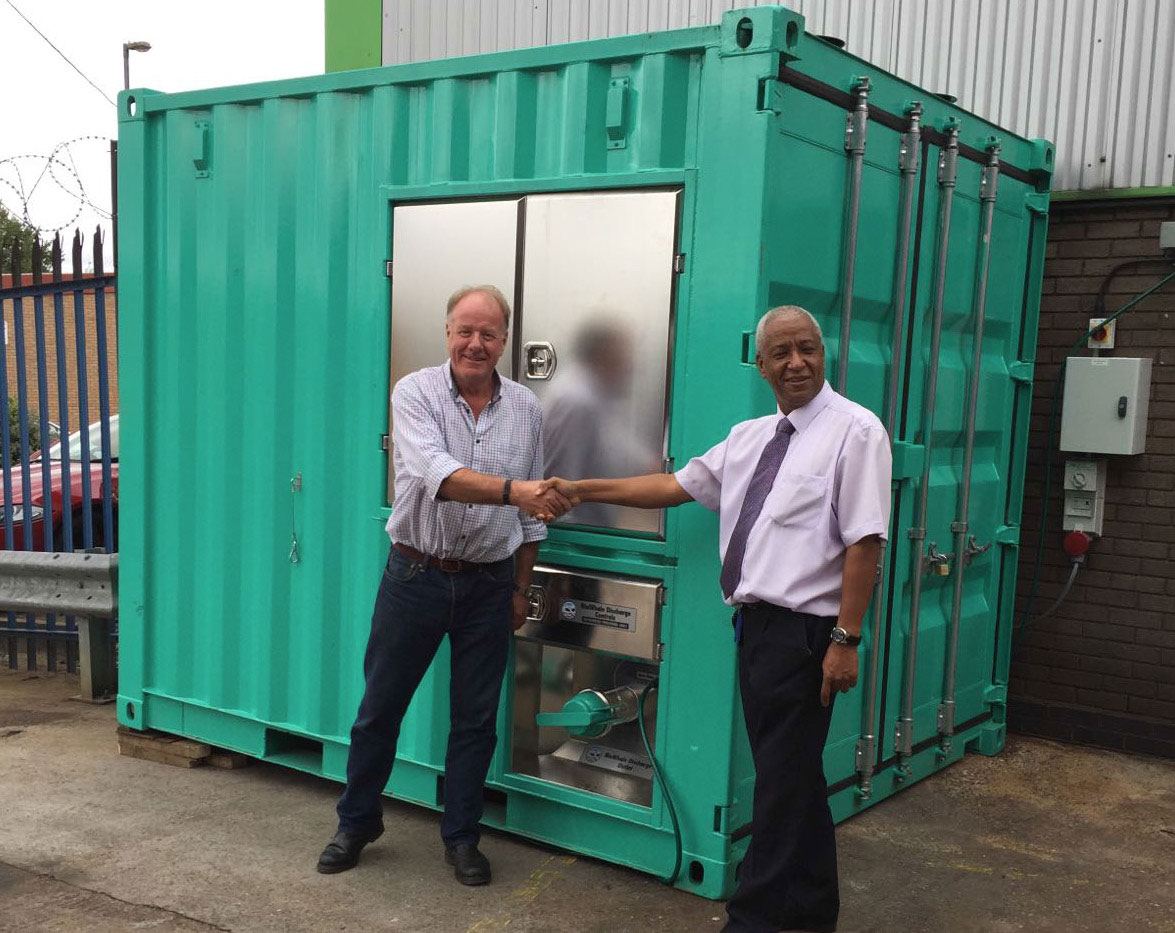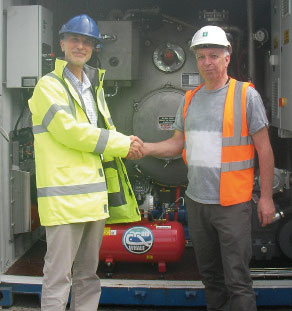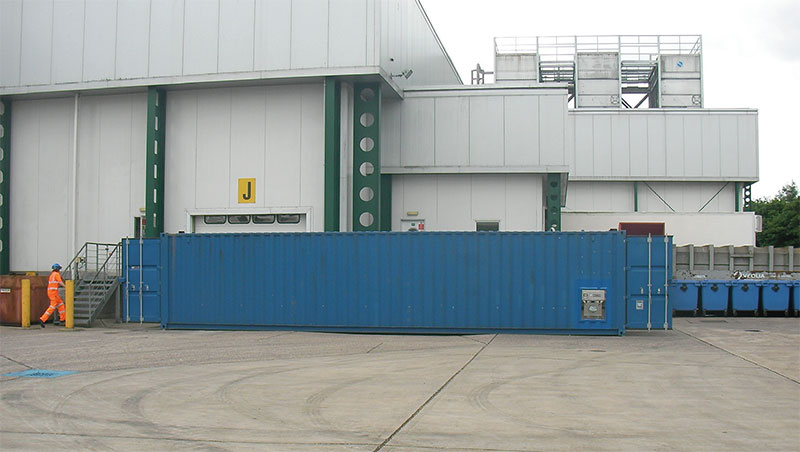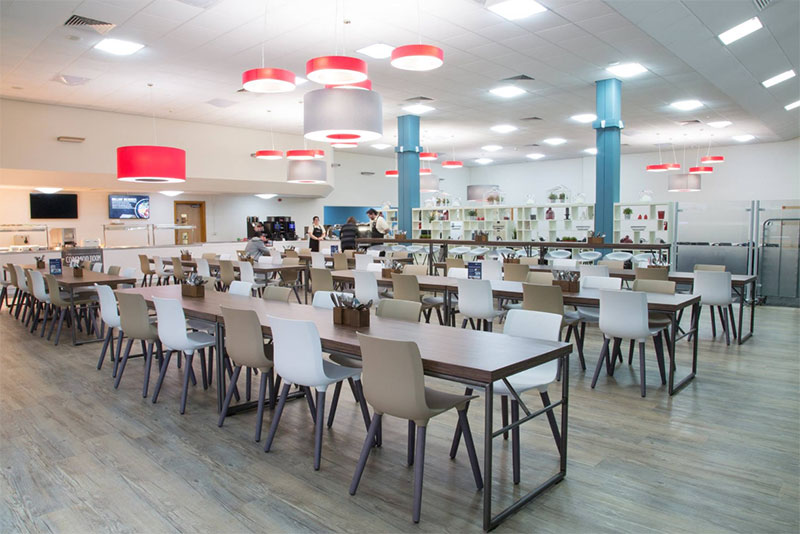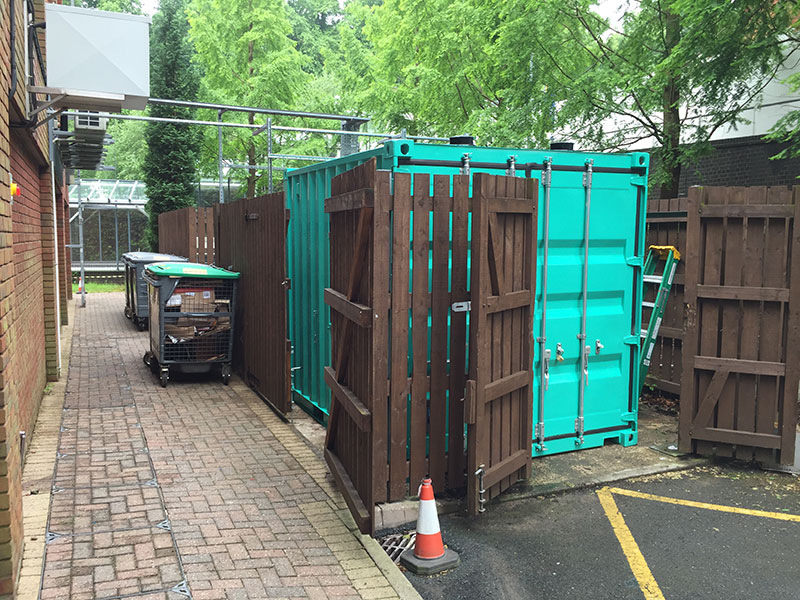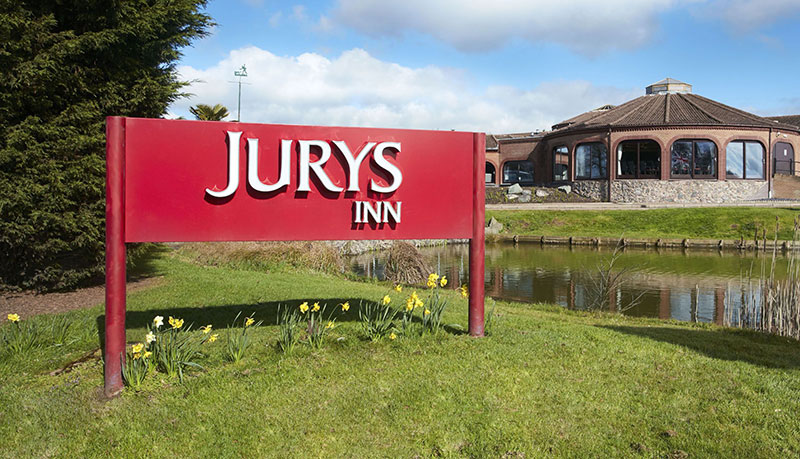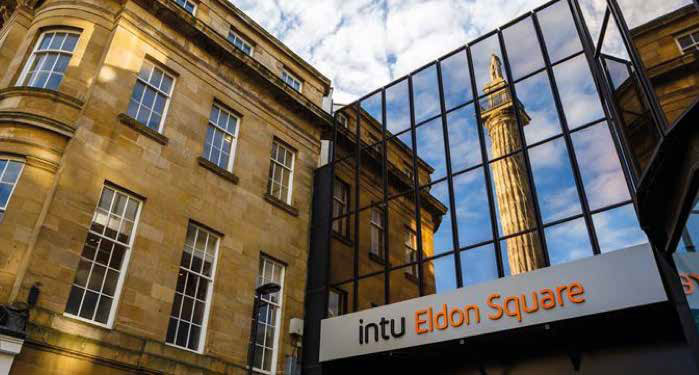
WestQuay
Westquay in Southampton is the UK’s largest dining
and leisure-led development. The 93,500 square-metre complex was completed in late 2016 and is home to 25 restaurants. These are expected to generate over 100 240-litre bins of unavoidable food waste per week for recycling.
Westquay is owned by Hammerson, whose portfolio includes
21 major shopping centres in the UK and France. Westquay’s building facilities provider is ABM. Both organisations are committed to the cost effective, socially responsible management of unavoidable food waste, with an emphasis on segregating this waste, then ensuring it is recycled.
Project Requirements
Typically, most shopping centres manage food waste by collecting it from restaurants and cafés to be placed in bins located in waste and recycling areas. Those bins are then wheeled to the centre’s service yard, where they are stored for collection.
However, at Westquay South, the combination of a large number of restaurants and limited service yard space raised three significant issues:
1
Even with daily pick-up, the large number of bins would occupy too much space.2
Pick-up frequency might interfere with truck deliveries.3
The annual 300-plus food waste pick-ups would increase both health and safety risks, as well as carbon emissions.
‘Our goal is not just to meet environmental requirements but to be ahead of the curve, which is where OWL’s service places us.’
Kate Neale,
Environmental and Energy Manager, Hammerson Plc
OWL Solution
OWL installed a standard-sized BioWhale, which can store the equivalent of 12 tonnes of food waste (or around 150 240-litre bins), yet has the footprint of just 10 wheeled bins. The unit was placed in Westquay South’s service yard, where the bins waiting for pick-up would have stood.
Westquay South’s BioWhale was specially designed to meet the centre’s space needs. Conventional BioWhales have a steel hopper on the side, into which food waste is loaded. Westquay South’s unit has been designed to allow waste to be loaded from a raised loading dock, via a 120-litre bin lifter.
Based on customer traffic in Westquay South, OWL expects to empty its BioWhale every 10 to 14 days.
Customer Benefits
OWL’s full-service solution costs less than alternative solutions
yet offers the following advantages
- Odour-free and hygienic food waste collection – unlike bins, which can spill, and compactors, which can leak.
- Low risk of pests and vermin.
- Lower carbon emissions, due to over 80% fewer waste collections.
- Lower health and safety risks, thanks to far fewer waste-vehicle journeys.
- BioWhale allows Westquay to optimise limited recycling space.
- OWL’s solution brings stronger recycling and responsible business credentials.
Cleone Foods Ltd
Jeremy Neal of OWL and Wade Lyn, company owner and Managing Director of Cleone Foods, shake hands upon delivery of their Compact BioWhale.
Cleone Foods is the UK’s largest manufacturer of Jamaican patties. Under its Island Delight brand, the Birmingham-based company – which employs 50 people – sells 100,000 patties each week to retailers, accounting for over half (55%) of the pattie market.
Since 2009, Cleone has had a zero-waste-to-landfill commitment. It is a past winner of the HRH Prince Charles’ Responsible Business Ambassador Award and the Santander Responsible Small Business of the Year. Despite its strong green credentials, Cleone continues to seek out new technologies and systems which will improve its CSR programme.
Project Requirements
Cleone generates around 2.5 tonnes of unavoidable food waste a week, most of which is dough. In the past, this was collected in small plastic caddies in the production area and emptied into 15 large wheeled bins on the production floor.
When full, these 110-litre bins were swapped for empty ones, and stored in an outside waste compound, ready for thrice-weekly collection. This process made it challenging for Cleone to maintain its exacting hygiene standards.
Cleone was also concerned odours and occasional spillages might attract vermin to the bins compound.
Plus, it felt freestanding bins full of food waste created an unsightly landscape for visitors. And so they approached OWL to assess whether its system could offer a cost effective alternative that would address their hygiene concerns.
OWL Solution
Cleone now uses a compact BioWhale, which can store the equivalent of 4 tonnes of food waste. Staff load waste into the BioWhale using easy-to-clean food-waste caddies.
There are no spillages, nor odours.
Customer Benefits
OWL’s full-service solution is cost neutral for Cleone, yet continues to deliver the following benefits:
- Easier-to-maintain hygiene standards in its production area.
- No more unsightly, malodorous wheeled bins that might attract birds, rodents, insects and other pests.
- A saving in CO2e emissions of nearly 500 tonnes a year, thanks to Cleone’s vastly reduced waste-collection requirements.
- The generation of sufficient energy through BioWhale- processed waste to heat 10 houses for a year.
- The enhancement of Cleone’s already strong reputation as an environmentally responsible business.
‘The BioWhale has made a massive difference to our operation in terms of improved cleanliness and reduction in odour. Importantly, it also makes a contribution to generating energy.
We are so pleased with the results.’
Simon Noble,
Cleone Project Manager
Cargill Meats Europe
Cargill’s Wolverhampton plant sits on a 13-acre site and has the capacity to produce up to 19,000 tonnes of product per year.
Cargill Meats Europe is an international producer and marketer of food products and services. Cargill operates a state-of-the-art further chicken processing plant in Wolverhampton, producing breaded and battered chicken products for a leading quick service food restaurant chain. The 13-acre site has the capacity to produce up to 19,000 tonnes of product per year.
Cargill is committed to sustainability, from farm to fork, constantly seeking better ways to minimise the environmental impact of its operations and supply chains. It is mindful, too, that commercial and industrial businesses in the UK food sector generate 2.8 million tonnes of food and drink waste each year, much of which ends up in landfill.
Project Requirements
Currently, food waste is segregated during the food manufacturing process and is transferred to stainless steel dolav
containers that are housed away from production areas. These containers are emptied into a skip located in a refrigerated storage area. The skips are collected daily and taken to an anaerobic digester.
Cargill wishes to continue recycling all of its unavoidable food waste, but is seeking a system that will allow it to do so at a reduced cost.
Current Issues
1
Refrigerating is costly, and is better suited to storing high-value products rather than waste.2
Skips cannot be filled to capacity, increasing pick-up frequency, so carrying a higher financial and environmental tariff.3
The current food-waste system is complex and significant worker involvement carries health and safety risks.4
Skips are difficult to clean. This can also attract vermin and carries a cross-contamination threat.
OWL Solution
OWL has installed a 24-ton Large BioWhale, located outside the Wolverhampton plant’s existing food-waste facility. Production waste is tipped utilizing the current dolavs from the containers to a bespoke hopper inside the production facility.
Waste is transferred from the hopper to the BioWhale unit via stainless steel piping. This is the first time we have facilitated the transfer of waste from a production floor to the BioWhale without the use of a new bin lifter. OWL solutions are bespoke, as this is how we meet clients’ varying needs.
Customer Benefits
OWL’s full-service solution provides significant cost savings for Cargill Meats Europe, and delivers the following additional benefits:
- No more waste refrigeration delivers energy and environmental savings.
- Refrigerated waste storage area now used for higher-value ingredients and products.
- No odours, messy spillage, nor overflows to attract pests or vermin.
- Fewer waste pick ups, cutting costs and reducing carbon footprint.
- Uninterrupted pipe-delivered BioWhale-loading.
- BioWhale capture of the value of high energy content in the food waste stream.
'OWL’s system makes us more efficient and sustainable, in one simple and elegant package. We have minimised our environmental impact and captured the full commercial value of our waste.'
Dave Mackay,
Cargill Meats Europe
Site Services Manager
The Large BioWhale allows tank storage for up to 24 tonnes
University of Wolverhampton
Telford Innovation Campus now uses a compact BioWhale to dispose of all unavoidable food waste from its busy canteen. Previously, waste was either stored in 240-litre wheeled bins (above) or ended up in the sewage system, via a macerator.
The University of Wolverhampton’s Telford Innovation Campus is home to over 3,000 students. The focus of the campus is engineering studies. It also helps local start-ups, by providing business support services.
Project Requirements
The campus operates a popular central cafeteria. Previously, unavoidable food waste, from both preparation and cooked waste, was collected daily in free-standing bins with plastic liners. These liners were carried outside and stored in
240-litre wheeled bins, which were collected twice a week.
In addition, food waste from the plate cleaning area was put down drains, ending up in the sewage system.
OWL Solution
OWL installed a Compact BioWhale in the campus’s waste and recycling compound. Cafeteria staff load the BioWhale at the end of each service, using 23-litre spill-proof plastic kitchen caddies. These are located in the food preparation area, as well in the dish collection-and-wash stations, and are easy to clean in the existing pot-washers.
The Compact BioWhale can hold the equivalent of 4 tonnes of food waste, and so requires emptying far less frequently than wheeled bins, thus cutting the campus’s carbon footprint and bolstering its green credentials (Standard and Large BioWhales hold 12 and 24 tonnes respectively, so larger volumes can be easily accommodated).
Customer Benefits
OWL’s full-service solution is cheaper for Telford Innovation Campus than alternative solutions, yet continues to deliver the following benefits:
- Macerated food waste is no longer put down drains, reducing strain on the sewer system.
- No more unsightly, malodorous, wheeled bins that can attract vermin and pests.
- BioWhale tank levels are remotely monitored through OWL's online system, ensuring on-time, hassle-free removals for the Campus.
- Fewer waste collections reduces the University's carbon footprint.
- Food waste is now 100% recycled, strengthening Telford Campus’ environmental responsibility credentials.
Jurys Inn, Hinckley Island
With OWL’s help, Jurys Inn is seeking environmentally sustainable and cost-effective solutions to the management of unavoidable food waste.
Jurys Inn Hinckley Island is a 362-room 4-star hotel in the Leicestershire countryside. It has a restaurant and an open eating area with a coffee shop, pizza bar and sports bar. It also boasts five function rooms, for catered events such as wedding, conferences, business networking events and product launches.
Project Requirements
The hotel currently recycles its glass but has no experience with food-waste segregation or recycling. It is now keen to explore environmentally sustainable, cost effective solutions for the management of unavoidable food waste, as well as recycling opportunities facilitated by the removal of food waste from their waste stream.
At present, kitchen waste is placed in lined bins along with general waste. When full, the bins are taken to an on-site compactor, located in a waste processing area.
Jurys Inn recognizes this is less than ideal; not only can spillages and odours attract vermin but disposal to landfill is costly, and has poor environmental outcomes.
The management team is mindful, too, of the bigger picture: that commercial and industrial businesses in the UK food sector generate 2.8 million tonnes of food and drink waste each year, much of which ends up in landfill.
'Our staff love OWL’s system – it reduces environmental impact, kitchen hygiene is greatly improved and it’s cost effective into the bargain.'
Rajeev Pillai,
Chief Executive Chef Jurys Inn
OWL Solution
OWL installed a Compact BioWhale in the existing waste processing area. The BioWhale is loaded using 23-litre spill-proof kitchen caddies. These are carried to the BioWhale via trolley and then easily cleaned in a pot-washer.
OWL’s system will also meet our client’s changing waste needs over time. With ongoing Jurys Inn improvements to food-waste segregation, the volume of unavoidable food waste requiring processing will grow; OWl’s service can be adjusted to meet any increased volume.
Customer Benefits
OWL’s full-service solution is cheaper for Jurys Inn than alternative solutions, yet
continues to deliver the following benefits:
- No odours, messy spillage nor overflows to attract vermin.
- BioWhale will meet our client’s growing foodwaste needs over time.
- Our single monthly fee includes 28 waste pick-ups per year.
- No up-front investment to affect other budgets.
- Increased opportunities to recycle non-organic waste.
- Greatly reduced carbon footprint.
'Our staff love OWL’s system. It massively reduces our environmental impact, kitchen hygiene is greatly improved and it’s cost effective into the bargain. By segregating food waste, we’ve reduced general waste removal from three collections a week to just one, every five to six days.'
Rajeev Pillai,
Chief Executive Chef Jurys Inn
intu Eldon Square, Newcastle
Eldon Square is one of the largest shopping destinations in the UK. All its unavoidable food waste is now recycled, thanks to OWL technology.
intu owns and operates shopping centres throughout the UK and Spain. Its intu Eldon Square shopping centre is the centre piece of Newcastle’s retail offering. With an annual footfall of 35 million, it’s also one of the largest shopping destinations in the UK, and home to 20 restaurants – plus cafés, kiosks and other grab-n-go outlets.
intu is mindful that commercial and industrial businesses in the UK food sector generate around 3 million tonnes of food and drink waste each year, much of which ends up in landfill.
That is why the company is looking to lead by example and has been actively seeking innovative solutions to improve food waste recycling. As part of that initiative, intu trialed the OWL System at intu Eldon Square and has subsequently approved it as a food waste recycling solution for the company.
Background
Pre-OWL, intu Eldon Square restaurants placed food waste in 20 and 45-litre lidded buckets that were carried to a service area and tipped into 240-litre wheeled bins. These bins were wheeled to a central waste area and collected four times a week by conventional waste trucks.
'....Through a sustained trial and evaluation period, the OWL system met intu’s rigorous standards and proved to be a safe, cost effective and hygienic solution.'
Mark Loubser,
Head of Environmental Services, intu Retail Services
OWL Solution
OWL installed a Standard BioWhale in the central waste area. The food outlets now deposit their unavoidable food waste into 120-litre wheeled bins which are brought directly to the BioWhale for loading. After loading the bins are washed and returned to the outlets. Collections are reduced by over 85%, taking place bimonthly.
Results
As part of the project, the total cost of OWL System was compared with alternative solutions, including all related labour costs, utilities and the impact of the cost of managing other waste streams. OWL was found to provide positive economic benefits, in excess of what was originally anticipated.
In addition to the positive economics, intu Eldon Square also achieves the following additional benefits:
- The Centre’s unavoidable food waste is now 100% recycled into green energy and organic fertilizer.
- By segregating food waste from its general waste stream, intu Eldon Square is now better able to recycle its non-organic materials.
- intu Eldon Square has reduced its carbon footprint by dramatically reducing the frequency of food waste pick-ups
- With the entire process running under vacuum, there are no odours, spillages, or leakages to attract insects and vermin.
- No up front capital costs incurred. Everything is included in OWL’s cost competitive, monthly service charge.
- intu Eldon Square is playing an active role in reducing the amount of organic material going to landfill, enhancing its reputation as a sustainable enterprise.
'OWL’s solution has not only helped us meet our recycling objectives but has also enabled us to manage our unavoidable food waste in a simple and clean fashion.'
Richard Williamson,
Environmental Services Manager, intu Eldon Square
